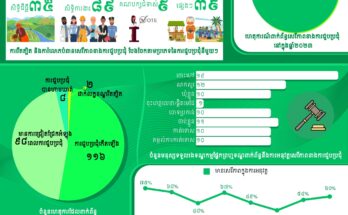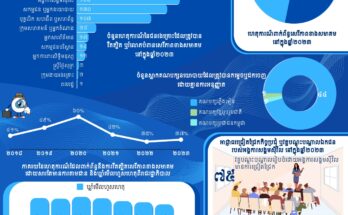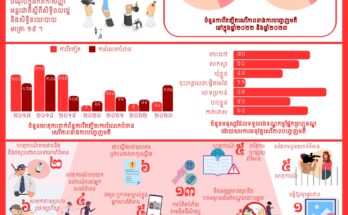This report outlines the challenges that Cambodian citizens face in exercising their expressive rights, particularly the freedoms of expression and peaceful assembly. It also analyses, where relevant, how the national election – held 28 July 2013 impacted these rights, and provides recommendations for a post-election climate with greater respect for expressive rights.
ADHOC has collected data from across the country to compile this report, in addition to utilizing eyewitness accounts of rights violations seen by ADHOC’s human rights monitors. This report also incorporates information from other local Non- Governmental Organizations (NGOs), International NGOs (INGOs) and media reports. This report cannot exhaustively detail the numerous and excessive violations of expressive rights in Cambodia over the past few years, but it refers to nmultiple case studies in an effort to demonstrate the reality of violations of expressive rights on the ground.
On paper, expressive rights are protected in Cambodia under both domestic and international law. Articles 31, 35, 41 and 42 of the Constitution of the Kingdom of Cambodia guarantee expressive rights for all Cambodian citizens. Cambodia has also an obligation under international law to respect, protect and fulfill the right to freedom of expression and peaceful assembly, having
ratified numerous international human rights instruments which explicitly guarantee these rights. The reality, however, is different. Since the Paris Peace Accords in 1991, through the United Nations Transitional Authority in Cambodia (UNTAC)1 and the five subsequent elections, the Royal Government of the Kingdom of Cambodia (RGC) has proven adept at adopting various human rights standards which it has then chosen to ignore. This narrative includes the government’s weak implementation of legislation to protect expressive rights. Moreover, the RGC has actually enacted legislation that contradicts its legal commitments to expressive rights. In Cambodia human rights are routinely violated. Corruption, nepotism, environmental degradation
and land grabbing plague the country. Workers face severe government repression when attempting to push for higher wages and improved working conditions. The authorities are hostile to freedoms of expression and assembly as these freedoms provide the legal basis to expose rights abuses and those behind them and to protest when they occur. Cambodia’s media landscape overwhelming favors the ruling Cambodian People’s Party (CPP). All Television and nearly all radio stations and newspapers are aligned to CPP supporters. Independent media outlets have been forced to answer questions by the government when they have been seen as too critical2 and in some cases, such as that of Beehive Radio FM 105, their very existence has been threatened. The authorities have also begun to move against online media and social networking sites as a means to silence dissatisfaction with the government being voiced online. The proposed Cybercrime Law may well be used to this end, demonstrating the
government’s fear of new media undermining state control of information. Journalists in Cambodia face harassment and death when detailing the illegal activities of rich and powerful people. Eleven journalists have been killed since 1994, most recently Hang Serei Udom, who was found murdered in the trunk of his car in September 2012. A judicial investigation as launched but was seriously flawed and nobody has been punished for his murder. he authorities have attacked and targeted journalists; in September 2013, reporters at Phnom enh’s Wat Phnom were attacked with electric batons when covering a vigil conducted by land ctivists. In May 2014, a reporter from Voice of Democracy was beaten unconscious by public order
guards, a para-police force notorious for attacking protesters in Phnom Penh. t is not surprising then that Cambodia’s World Press Freedom ranking has fallen steadily from 117 out of 179 in 2012 to 144 out of 180 in 2014 according to Reporters Without Borders, a drop of 27 places in two years. Freedom House, in its own 2013 assessment of press freedom, found a
similarly restrictive landscape, categorizing Cambodia’s press as “not free”. The assessments by Reporters Without Borders and Freedom House are consistent with ADHOC’s own observations and fit into a wider context in Cambodia in which expressive rights do not meaningfully exist.



